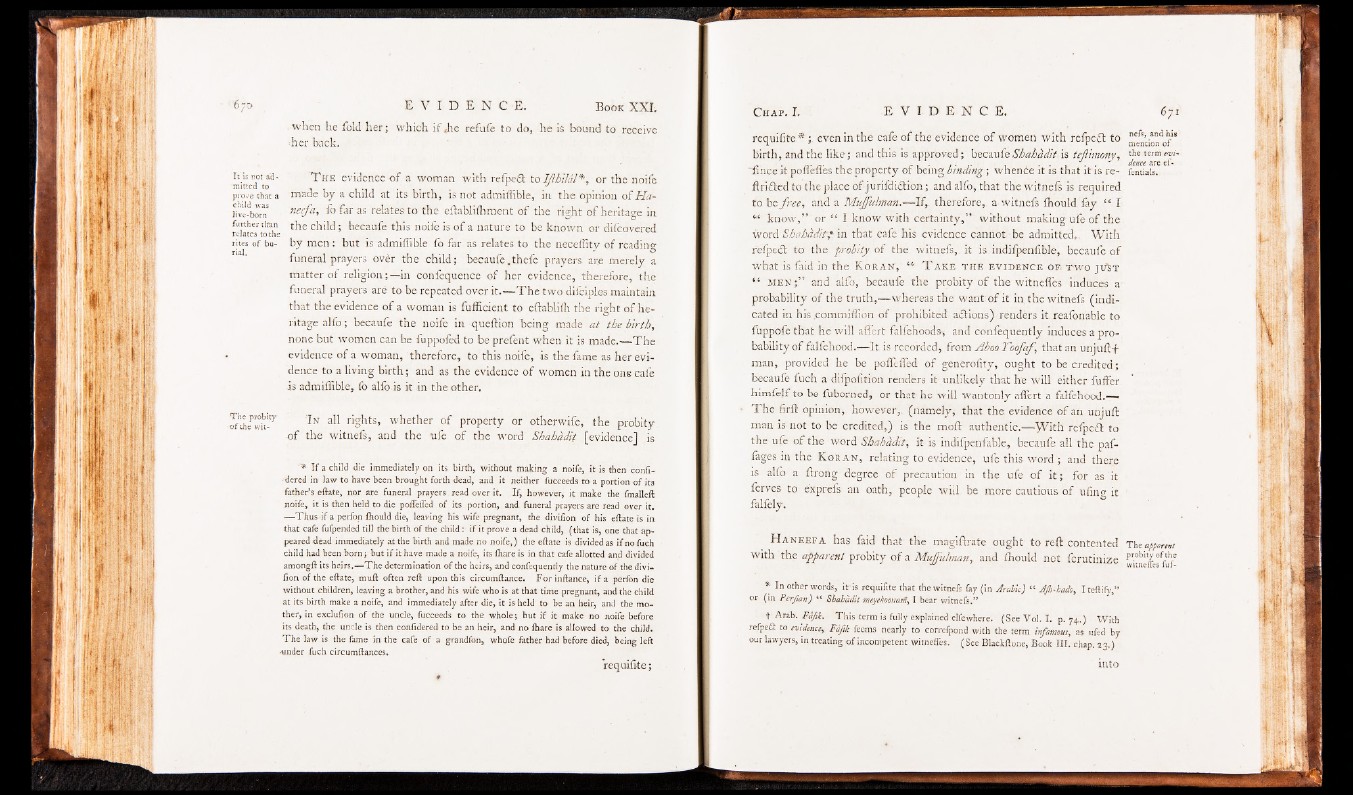
.when he fold her;
:her back.
which if die refufe to da, he is bound to receive
it is not ad- T he evidence-of a woman with refpedt to l/ihildl*, or the noife
prove that a made by a child at its birth, is not admiffible, in the opinion of Ha-
Hve-bom necfa, fo far as relates to the eftablifhment of the right of heritage in
further than the child; becaufe this noife is of a nature to be known or difcovered
relates to the #
rites o f bu- by men: but is admiffible fo far as relates to the neceffity of reading
funeral prayers over the child ; becaufe.thefe prayers are merely a
matter of religion.;— in confequence of her evidence, therefore, the
funeral prayers are to be repeated over it.— The two difciples maintain
that the evidence of a woman is fufficient to eftablifh the right of heritage
alfo; becaufe the noife in queftion being made at the birth,
none but women can be fuppofed to be prefent when it is made.— The
evidence of a woman, therefore, to this noife, is the fame as her evidence
to. a living birth; and as the evidence of women in the one cafe
is admiffible, fo alfo is it in the other.
rf1'thePwh-Jy a11 rishts’ whether of property or otherwife, the probity
-of the witnefs, and the rife of the word Shahadit [evidence] is
I f a child die immediately on its birth, without making a noife, it.Is then confi-
■ dered in law to have been brought forth dead, and it neither fucceeds to a portion o f its
father’s eftate, nor are funeral prayers, read over it. If, however, it make the fmalleft
noife, it is then held to die poifeifed o f its portion, and funeral prayers are read over it.
— T h u s -if a perfon fhould die, leaving his wife pregnant, the divifion o f his eftate is in
that cafe fufpended till the birth o f the ch ild: i f it prove a dead child, (that is, one that appeared
dead immediately at the birth and made no noife,) the eftate is divided as i f no fuch
child had been born; but i f it have made a noife, its fhare is in that cafe allotted and divided
amongft its heirs.— T h e determination o f the heirs, and confequently the nature o f the divi-
fion of the eftate, muft often reft upon this circumftance. F o r inftance, i f a perfon die
without children, leaving a brother, and his wife who is at that time pregnant, and the child
at its birth make a noife, and immediately after di.e, it is held to be an heir, and the mother,
in exclufion o f the uncle, fucceeds to the whole; but if it make no noife before
its death, the uncle is then confidered to be an heir, and no fhare is allowed to the child.
T h e law is the fame in the cafe o f a grandfon, whofe father had before died, being left
.under fuch circumftances.
requifite*even in the cafe of the evidence of women with refpedt to
birth, and the like; and this is approved; becaufe Shahadit;is tejiimony,
“fince it pofletles the property of being binding;-, whence it is that it is re-
ftridted to the place of jurifdidtion;..and alfo, that the witnefs is required
to befr-ee, and.a Mujfulman.— lf,. therefore,, a*witnefs fhould. fay “ T
“ know,” or “ I know with certainty,” without making ufe of the.
word Shahadit? in that cafe his evidence cannot be admitted,. With
refpedt to the. probity of the. witnefs,. it is ,indifpenfible,. becaufe of
what is faid in the Koran, T ake the evidence of, two jiftT
“ men;” and alfo, becaufe the probity of the witneffes induces a-
probability of the truth,— whereas the wanfcof it in the witnefs (indicated
in his.commiffion of prohibited adHons).renders itreafbnable to
iuppofe that he will afl'ert falfehoods-, and confequently induces a probability
of falfehood.— It is recorded,, from AbooYoofaf, that an unjuft-f-
man, provided’ he be poflefled of generofity, ought to be credited;
becaufe fuch a dlfpofition renders it ,unlikely that he will either fuffer
himfelf to be fuborned, or that he will wantonly aflert a falfehood.—
The firft opinion;, however,, (namely, that the. evidence of an .unjuft
man is-not to be credited,) is the molt authentic.— With refpedt to
the ufe of the word Shahadit, it is indifpenfable, becaufe all the paf-
fages in the Koran, relating to evidence, ufe this word; and there
is alfo a ftrong degree of precaution in the ufe of it; for as it
ferves to exprefs an oath, people will be more cautious, of ufin<* it
falfely. 13
Haneefa has faid that the magiftrate ought to reft contented
with the apparent probity of a Muffulman, and fhould not fcrutinize
* In other words, it is requifite that the witnefs fay (in Arabic) “ AJh-bado, I teftify,”
or (in Pcrjian) tc Shahadit meyekoonam, I bear witnefs.”
y A n b . F a f ik . T h is term is fully explained elfewhere. (See V o l. I . p. 74 .) W ith
refpe<ft to ev iden c e, F d ftk feems nearly to correfpond with the term in fam ou s, as ufed by
our lawyers, in treating o f incompetent witneffes. (See Blackftone, Book III. chap. 23.)
nefs, and his
mention o f
the term evidence
are ef-
fentials.
The apparent
probity o f the
witneffes fuf